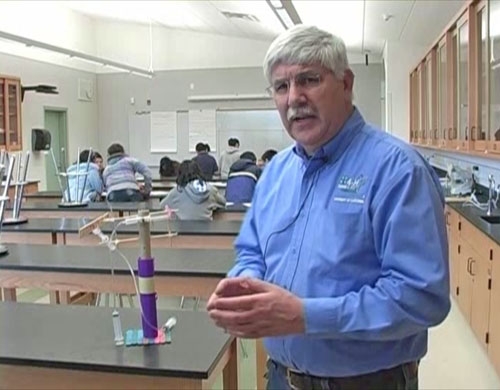
Mahacek was an industrious youngster. In addition to participation in 4-H projects in electricity, woodworking, cooking and raising cattle, he worked on the family farm and managed a 120-home newspaper route for 6 years. His earnings from the paper route and selling the animals he raised in 4-H went towards his college education.
Mahacek earned a bachelor’s degree in industrial arts at San Jose State University in 1974. He considered a career as a high school shop teacher, but ultimately chose a path that allowed him to extend the benefits he derived from 4-H with youth of subsequent generations. He was named the 4-H Youth Development advisor for Merced County in 1976. In 2005, Mahacek added administrative duties to his job, when he was named director of UC Cooperative Extension in Merced County.
During his career, Mahacek placed an emphasis on mechanical sciences and engineering projects. His work included development of curricula and activities in science processes, robotics, computers, GIS/GPS, bio-security and environmental issues, such as watersheds and wildlife habitats.
In 1988, Mahacek was a member of the team that developed the 4-H SERIES (Science Experiences and Resources for Informal Educational Settings) curriculum, which was funded by the National Science Foundation and Kellogg. SERIES was the first comprehensive pragmatic science education curriculum to join 4-H’s traditional projects. In 2004, Mahacek served on the national leadership team for 4-H SET (Science, Engineering and Technology), a program that succeeded SERIES. SET aims to enhance young people’s interest in developing the knowledge and skills needed for the 21st century’s technically oriented careers.
The crowning achievement of his career was the development of the 4-H Junk Drawer Robotics curriculum in 2011. The curriculum shows how to engage children in building robotic devices with rubber bands, Popsicle sticks, medicine dispensers and bamboo skewers – the kinds of things people already have around the house. The robotics program develops skills that go beyond science and engineering. The children learn communications, teamwork and critical thinking.
“Junk drawer robotics is hands-on as well as heads-on,” Mahacek said. “We’re getting kids to be innovative, to come up with ideas themselves. When they come up with their own designs, and then build them, they have internalized the concepts much more than if they are just following directions.”
Junk drawer robotics is one part of a three-track robotics curriculum. The other tracks are virtual robotics, in which participants build virtual robots on computers, and robotics platforms, which employs commercial robot building kits for materials. The package of robotics programs was the No. 1 selling 4-H curriculum in the nation in 2011.
Mahacek received many honors for his contributions to 4-H and UC Cooperative Extension. In 1988 he received distinguished service awards from the state and national 4-H associations. The Merced County Farm City Ag Business Committee presented him its Agri-Education Award in 1992. When his daughter, Anne, was part of UC Merced’s first graduating class in 2008, Mahacek, his wife Susan and Anne received the UC Merced Student Affairs Parent-Family Recognition Award. Last year, Mahacek received the “Hands-On Heroes Award” at the Merced County Children’s Summit.
Mahacek said the 4-H program has evolved during his tenure, but it has not changed its core objectives.
“We went from being a predominantly ag program to including many other topics. Our members used to live in just rural settings, but now they come from the suburbs and urban neighborhoods,” Mahacek said. “But we’re still promoting the concept of working together and gaining confidence by learning practical skills.”
He said 4-H is fundamentally different from programs that focus specifically on developing self-esteem.
“In 4-H, we teach kids positive things to do and make and it builds their self-esteem when they have these abilities and capabilities,” Mahacek said.
All three of Mahacek’s children were active 4-H members, achieved 4-H All Star status – the highest county honor – and pursued higher education and careers in science and engineering.
In retirement, Machacek plans to visit Europe and, in particular, Southern France, where his middle son is working on an ocean acidification research project. Closer to home, Mahacek also plans to spend more time in his backyard workshop, where he is restoring a 1967 Pontiac Firebird and farm equipment that dates back to the early 1900s.